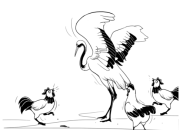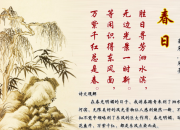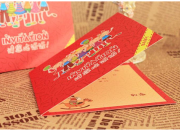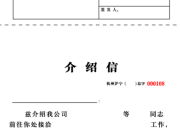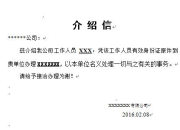I was on the edge of the Grand Canyon的教案
时间:2021-08-31Module 1 Wonders of the world

Unit 2 I was on the edge of the Grand Canyon.
课型:读写课
一.教学目标:
1. 熟练掌握本单元的语言点。
2. 了解自然景观,培养自己热爱大自然、热爱祖国的情感。
二.课前准备:
1. 课前朗读 预习本课的词汇、语言点。
2. 每日播报:
3.预习课文并完成下列问题。
1) Where may the passage come from?
A. A guidebook .
B. A grammar book.
C. A dictionary.
D. A diary .
2) Why was there nothing to see?
A. Because there was nothing
B. Because it was too dark.
C. Because it was raining.
D. Because it was in the morning.
3) Where was the writer facing on the edge of the Grand Canyon?
A. To the south
B. To the north
C. To the east.
D. To the west.
4) What is the winner’s purpose in writing this passage ?
A. To give facts about the Grand Canyon.
B. To tell how he feels about the Grand Canyon.
C. To describe the Grand Canyon.
D. To tell people to visit the Grand Canyon.
三.课堂活动
读前导入:
Think of any wonders of the world, such as buildings, mountains, rivers, seas, towers, waterfalls and etc, then describe it.
多层阅读
1. Read the passage and describe what you can see in the photo. Work in pairs. Try to describe what you see in the photo by using the words below.
ancient deep high long modern natural tall wide
2. Read the passage again and try to fill the form with the facts about the Grand Canyon.
Grand Canyon
How deep /wide is it?
How wide is it ?
How long is it ?
精读足练
1.After reading the passage and match the words in the box with their meaning.
anywhere not made by people
gate an entrance
huge someone you don’t know
natural very very big
stranger in any place
2.Read the passage again and try to find out the main language points in it by yourselves, then talk about them in groups.
Have a try! And translate!
1) 从……里出来_______________ 2)走过大门_______________ 3)在东方_______________ 4)检查_______________ 5)太……而不能_______________ 6)fall away _______________
7)处于……的边缘_______________ 8)在……底部_______________ 9)look across _______________ 10)on both sides _______________ 11) over 400 kilometers long _______________
精讲点拨
1. through 与 across的区别:through 是“穿过”的意思,是介词,常指“从某空间内或某物中间穿过”,多指穿过门、窗、洞、森林、隧道等;across是指“从某个平面横过”,多指穿过街道、马路、桥梁、河等的表面。
例如: walk through the forest , run across the bridge.
2. in five minutes 意为“5分钟以后”,“in +一段时间”表示“在一段时间之后或之内”,常用于一般将来时,用“how soon”提问。
【拓展】
与how 有关的疑问词
How long 是“多久”的意思,常对for 和 since 引起的表延续的短语提问,常用于现在完成时;
How often 有“多久一次”的意思,对频率提问,如 often ,sometimes,twice a week 等表示频率的词或短语,常用语一般现在时或一般过去时;
How many 后跟复数名词,对可数名词的量来提问;
How much 后可跟不可数名词,对不可数名词的量来题问,或对价格提问;
How many times 对次数提问,如twice,several times等,是“多少次”的意思,常用于现在完成时;
How far 对距离提问;
用适当的疑问词完成句子
1)_______________ is it from your school to your home?
2) _______________ has he been to the USA? Once.
3) _______________ does the boy visit his grandparents?
Twice a month.
4) _______________ will your sister come back from Shenzhen?
In a week.
5) _______________ are the shoes?
One hundred yuan.
3. too … to … 是“太……而不能……”的意思。可与enough… to…,so … that…改写。
例如: He is to young to go to school.-------同义句
He isn’t old enough to go to school.
He is so young that he can’t go to scool.
四. 学习成果展示
1. 选择正确的答案
1) All the students will climb the mountain if it _______ rain tommow.
A. won’t B. don’t C. didn’t D. doesn’t
2) — _______ will the supper be ready? I’m very hungery.
— In a minutes.
A. How soon B. How long C. How much D. How often
3) Please turn on the light. It is _______ dark _______ see anything in the room.
A. too,to B. so, that C. such , that D. too, not to
4)The two men walked _____ the tunnel and got to a small house .
A. across B. through C. crossing D. over
2. 完成句子
1)During the trip, after _______ _______ ( 穿过) the forest , we sailed _______ ( 横渡 ) a big river.
2) The river in our hometown is about _______ _______ _______ (2000 公里长)。
五.当堂反馈小结: 回想本课所学内容,你学到了那些?你还有那些疑问?
课后延伸
Ⅰ. 单项选择
1. —What about listening to some light music?
—_____________.
A. It doesn’t matter B. That’s all right C. It’s my pleasure D. Good idea
2. My aunt isn’t here. She____- Shanghai on business. She will be back in three days.
A. went B. has gone to C. has been to D. will go to
3“When did you buy these new CDs?” “I ___ them for tow days.”
A. had B. have bought C. have had D. bought
Ⅱ. 阅读理解:
Swimming and English learning
Can you swim? Do you like swimming? Yes? Well, how can you learn to swim? I think the best way is to go into the water and learn. I’m afraid you’ll never swim. It’s the same with the English study. We must practice, practice and practice.
Listening and speaking are very important for beginners. The children in English-Speaking countries first listen to others. Then they try to imitate and speak . We can listen to English programs on radio. You may just understand a few words. It doesn’t matter. Just be relaxed, try to catch every word.
Somebody may be a good listener. But he dare not speak. He’s afraid of making mistakes. You know we sometimes make mistakes when we speak Chinese, Don’t be afraid. We must be brave. If you really want to learn English well. You must try to speak with everyone so long as he knows English. Whether you know him or is not important when there’s nobody to talk with, you can talk to yourself in English. It’s interesting and also a good way to practice your spoken English. Remember, the more you speak, the fewer mistakes you’ll make.
Reading and writing are more important for senior school students. First we must choose the books we’re interested in. A lot of reading will improve your language sends. This is the most important.
Keep writing English diaries. We can also write English articles. You may even post them to English magazines. Don’t be afraid of failure. Failure is the mother of success.
Easier said than done. Well, let’s do more from now on. I’m sure you’ll learn English well in this way.
( ) 1、You can learn to swim by _______.
A reading books about it B looking at others swimming C having lessons on it D going into the river and learning
( ) 2、We should learn English by __________.
A listening and speaking B reading and writing
C swimming D both A and B
( ) 3 What will you do with mistakes when you speak?
A Don’t make mistakes. B Study hard.
C Try not to speak English. D Don’t be afraid.
( ) 4 What’s more important for senior school students?
A Listening. B Speaking C Reading and writing D Learning
( ) 5 We can listen to English ______ according to the passage.
A by train B on the radio C every minute D now and then
Ⅲ. 写作练习
Imagine you have seen one of the wonders of the world.Write sentences describing how you felt when you saw it for the first time.

